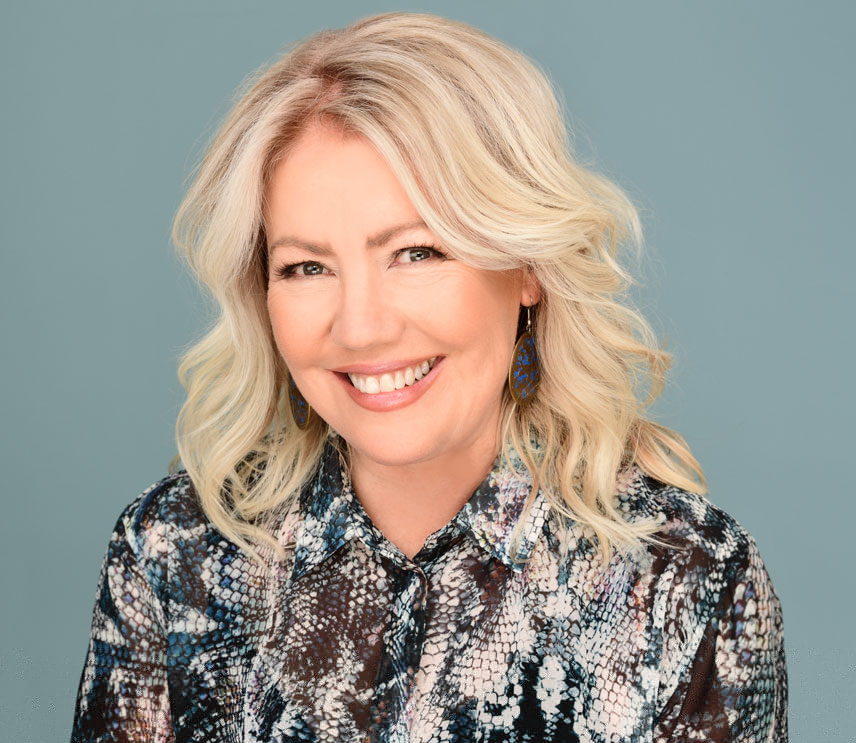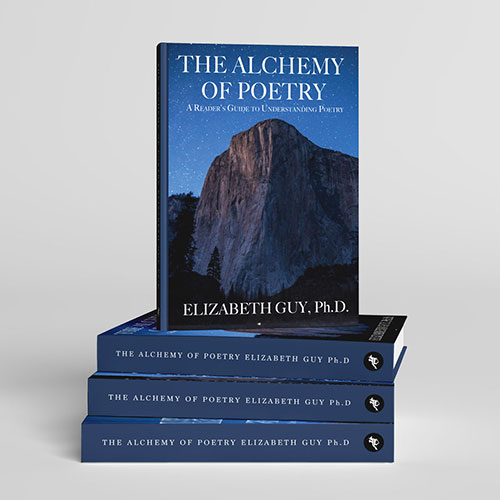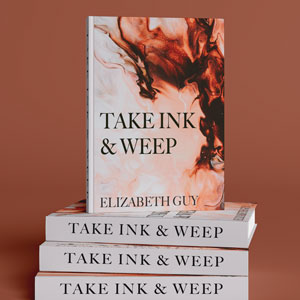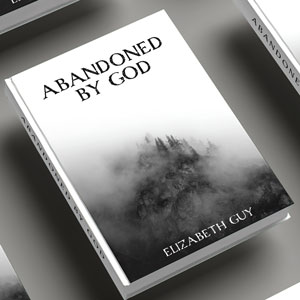-
Archives
-
Meta
-
About Me

Elizabeth is a writer of nonfiction and fiction. Heaney’s words “Walk on air, against better judgement” has become her talisman for life. In other words - be bold!
The Alchemy of Poetry
A reader's guide to understanding poetry


Elizabeth’s first book, The Alchemy of Poetry, is now in its 2ND EDITION and available in Australia!
It would make the perfect gift for someone who is interested in the world of art and poetry and history and politics and love and death and war and the sublime. The 160 poems that have been selected and analyzed in The Alchemy of Poetry succinctly and pitch-perfectly offer all this and so much more!
Poetry makes sense of life; it offers us truths; it brings us unimagined worlds; and it liberates our pain. In moments of great joy or sadness, it is poetry which says the impossible, ensuring that the poignancy and loveliness of our humanity never passes into nothingness.
Great Art belongs to everyone; thus, it is crucial that we continue the dialogue between ourselves and the poems. It is in this dialogue that we witness the alchemy of poetry: the way it transmutes from a language form and feature to a universal elixir.
What is the point of living if there is no Art? And poetry is the most concentrated of all Art. It is the oldest of all literary forms. Poetry offers ritual and cadence: sacrifice and secrets. It is audacious and disturbing but always – and this applies to all great poetry – yours. Mine. Ours.
So, we read poetry to face the truth. To stand there and dig in, to stumble over words we don’t get, to find a phrase that flicks a light on in our memory, to cat-paw over and over an image that was laid down long ago. Most of all, we read poetry to remind ourselves of what really matters: to witness the soaring light that tears up our small lives.
Get your copy and send Elizabeth your review!
The Alchemy of Poetry by Elizabeth Guy
Published by First Rider Publishing
Paperback; 514 pages; ISBN- 978-0-6451113-09
Genre: Poetry; Poetry Analysis and Discussion; Ancient, Classical and Contemporary Poetry; Education and Teaching; Non-fiction
Price: $30
Available here
FISHPOND
https://www.fishpond.com.au/Books/Alchemy-of-Poetry
AMAZON
https://www.amazon.com/books/alchemy-of-peotry
BOOKTOPIA
https://www.booktopia.com.au/books/alchemy-of-peotry
KOBO
https://www.kobo.com/books/alchemy-of-peotry
POWELLS
https://www.powells.com/books/alchemy-of-peotry
KOGAN
https://www.kogan.com/books/alchemy-of-peotry
WATERSTONES
https://www.waterstones.com/books/alchemy-of-peotry
REVIEWS
Elizabeth is a talented and generous academic, crafting here an eloquent analysis of carefully selected poetry from around the world. Across time and place, Elizabeth writes with an insightful knowledge and a uniquely witty voice, I will be sure to use this book in the classroom and to inspire my own conversations about art, poetry, and life. With intelligence and good humour, Elizabeth breathes life and clarity into this exquisitely- chosen anthology of poetry and generously offers an extensively-researched analysis. Elizabeth writes The Alchemy of Poetry as the Chief Wizardess, concocting a flawless poetic analysis by mixing history, the visual arts, and her crackingly witty personal voice with these chosen poetic writings. This book is a must-have for educators, artists, historians, readers and writers. – Lucy Rose Educator of English Literature and an Academic Presenter for the English Teacher’s Association.
BY CHRIS CHEVALIER I did not read poetry at boarding school, I was too focused on rugby and girls, nor am I schooled in this art. However over recent years, with Elizabeth’s help, I have come to the realisation that understanding poetry is to understand that the readers imagination can be liberated, with the help of the poet. Any number of readers may reach all manner of different outcomes. And that’s ok. THE ALCHEMY OF POETRY has helped me journey in this art form. Just like Betty Churcher who has helped many understand fine art, so does Elizabeth Guy, help people understand the art of poetry. This book allows me to understand the process and helps me to turn what I read into an extraordinary thing, sometimes in a way that I can’t explain. She has the ability to turn words into beauty. That’s an Alchemist. And her book has put me in the mood of analysing poetry that I am now coming across daily: Take ‘Red Right Hand’ by Nick Cave, he says in part …… Where the viaduct looms like a bird of doom, as it shifts and cracks…. a very visual and provocative image in 1994. You have your take on this, as do I, and often they are different based on the readers background experiences. Also, Sixto Diaz Rodriguez (March 1970) is another case in point where he’s says in ‘Inner City Blues’ ….madness passed me by, she smiled hi, I nodded. I looked up as the sky began to cry, she shot it. ….crippling, destitute, poor, trying to survive in Detroit USA,, but is it? You be the judge. So, go buy a copy of THE ALCHEMY OF POETRY – it begins that conversation between yourself and poetry, a conversation that will go on well after you have put the book down!
The Alchemy of Poetry by Elizabeth Guy successfully identifies the ways in which poetry transforms words into a life of their own. As it moves from ‘Poetry Confronting Art: Ekphrastic Poetry’ to ‘Troubled Pleasures: The Romantics’ to ‘As We See Ourselves: Australian Poetry’ to ‘Poetry that Saves a Nation: Nobel Laureates’, Guy’s anthology provides an insightful analysis of poems that range across time and structure, as well as thoughtfully participating in a conversation that recognises the power of poetry and the ways in which it reflects human suffering and joy. The language in which Guy discusses the poetry is sophisticated and her analysis is enlightening. On Yeats’ poem Leda and the Swan, Guy writes of ‘its chiselled bone and voluptuous flesh’ and how it ‘contemplates the dark side of desire’. This refined examination of the poem is also seen in her exploration of Noel Rowe’s poem Next to Nothing, ‘The eights stanzas that make up free verse contain a centre space margin. A backbone space that splits the lines in half’. For each of the poems included in this anthology, Guy provides an analysis that is informative educational and beautifully written. One of the things I particularly like about this anthology is how Guy often introduces poems by describing her personal connection with or feeling about the poem. For example, the first thing Guy writes after the poem Replica of The Thinker by Matthew Olzmann is, ‘I really like this perky little poem. In its simplicity, it is both elegant and complex’. On the poem The Joy of Writing by Wislawa Szymborska, Guy writes, ‘I have loved Szymborska for a long time and my love affair began with this very poem’. These two examples allow the anthology to become more than academic, but illustrates how poetry can have an impact on people intimately. The Alchemy of Poetry is an anthology that I have loved reading and will continue to enjoy. It has developed my understanding on the importance of poetry and has provided me with insight into various poets I did not know. This is a superb poetry anthology. – Elizabeth Williamson
This is a hefty and well-researched publication written by Australian author and scholar Elizabeth Guy, whose insightful and extensive analysis of a wide range of poetry genres makes this a publication worthy of prime real estate on the bookshelf of any English teacher, poet, or literature lover, not only as a valuable reference text, but as a source of inspiration and an invitation to delight, discover and drink deeply (as alliterative as that may be). Indeed, what sets this apart from many other books on poetry is Guy’s unadulterated, undisguised passion for it: Poetry is a religion and it cannot be stopped. Poetry offers ritual and cadence: sacrifice and secrets […] Poetry is sacred and profane and thus it is at once sublime and mighty’ (p.6). In ten substantial chapters (and 460 pages), Guy fathoms the wonders of ekphrastic poetry, the sonnet, poems of pilgrimage, numinous poetry (‘poetry with a Divine Will’), Romantic poetry, Pre-Raphaelite poetry, poetry from Australia, Ireland and Russia, and the works of Nobel Laureates Giorgos Seferis, Pablo Neruda, Dereke Walcott, Seamus Heaney, Wislawa Szymborska and even Bob Dylan. She offers a ‘close analytical reading’ of representative poems selected not only for their literary value, but curated as part of her own personal canon. Guy lovingly invites us to experience each poem by weaving it into the narrative of how these poems emerged from their sociocultural, historical, literary, political and personal contexts, and how she herself first encountered them. Guy is a seasoned university lecturer and her writing is both didactic and personal. Consider how she revels in Seamus Heaney’s Lightenings vii: I go back to this gorgeous little sonnet time and time again. Whenever I read it I feel I am in a cinema: all dark and quiet and full of anticipatory excitement … the poet reminds me that all is possible in the dark fathomless sea of my imagination. (pp.331-332) This book will richly nourish the minds of those students in Advanced, Extension 1 and Extension 2 who are already starting to fall a little bit in love with language and literature. In building the field for the Common Module: Texts and Human Experiences, extracts from the chapter entitled ‘Poetry confronting art: Ekphrastic poetry’ would be useful in introducing students to Rosemary Dobson’s poems and the chapter on Australian poetry could be referenced before unpacking Kenneth Slessor’s poetry. The chapter entitled ‘Making life easier to bear: The sonnet’ would complement Donne’s poems, and ‘Troubled pleasure: The Romantics’ includes a detailed and thoughtful analysis of ‘To autumn’ and ‘Ode to a nightingale’, both useful for Advanced Module A: Textual Conversations. The chapter on Irish poetry includes two poems by W.B. Yeats, and the chapter on ‘Numinous poetry’ features both Donne’s ‘Death be not proud’ and T.S. Eliot’s ‘Journey of the Magi’. As Darryl Kerrigan might say if he were an English teacher, it just paid for itself. I have only gentle criticism to offer this text. I would have liked to see more Indigenous and First Nations poetry, for starters. Then there’s the index, or lack thereof – this is the kind of book I want to dip in and out of and having a handy reference section at the back would help me to find precisely what I am looking for instead of scanning fortyodd pages within a chapter to find what she has written on one particular poem of interest. Then again, perhaps that is the intention – Guy doesn’t want us to use her book as an encyclopaedic guide to every poem ever written, but as a gateway to luxuriate in poetry, to appreciate its ‘alchemy’ and came away with something deeper.
-
About Me



Elizabeth is a writer of nonfiction and fiction. Heaney’s words “Walk on air, against better judgement” has become her talisman for life. In other words - be bold! -
Follow Me On
-
Subscribe to My Newsletter
-
Recent Posts
-
Recent Comments
-
Subscription
-
Recent Posts
-
Reflection: Why Poetry?March 19, 2021
-
Poetry Review: Rag and Bone by Norman MacCaig (1980)March 18, 2021
-
Book Review: Did you miss this one? True Country by Kim Scott (1993)March 17, 2021
-
Reflection: Why Poetry?
-
Popular Posts
-
Poetry Review: AkhmatovaDecember 15, 2020
-
Reflection: Visiting Anna Akhmatova’s homeDecember 15, 2020
-
Book Review: Recent ReleaseDecember 17, 2020
-
Poetry Review: Akhmatova
© Copyright Elizabeth Guy - Developed by Webglobic Technologies & The Social Designer Australasia | Privacy Policy









Leave A Reply